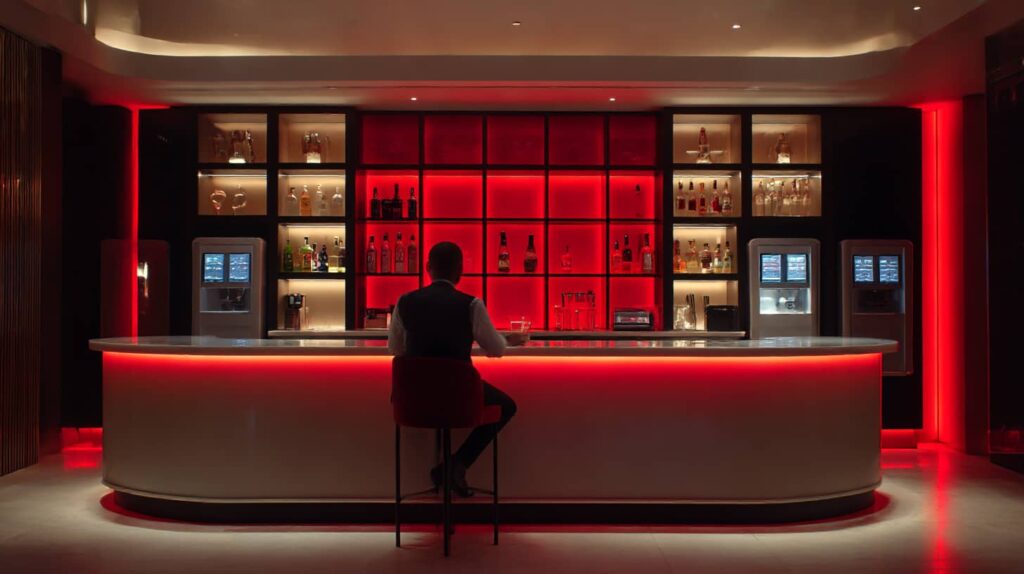3.47 am. A business traveller orders an espresso martini at the hotel. Two years ago, that would have been impossible. Today, the automated bar runs without getting tired. While traditional happy hours take place between 5 and 7 p.m., some establishments are revolutionising the concept completely: why only two hours when 24 are possible?
The era of cocktail culture begins.
The outdated concept of happy hour
Happy Hour was born out of necessity: bars wanted to liven up dead times and attract guests before the evening rush. That was clever - for 1970.
Why happy hour is problematic today:
- Artificial scarcity: Only two hours of cheap cocktails seem antiquated today
- Staff shortages: Peak times overload the team
- Missed opportunities: 22 hours a day without cocktail sales
- Inflexible target groups: Shift workers, early risers and night owls are left out
A hotelier from Frankfurt recognised the problem: "Our Japanese guests wanted cocktails at 6am. Happy hour at 6 p.m. didn't help them."
24/7: The new reality
What enables permanent cocktail availability?
Fully automatic systems know no working hours. They mix just as perfectly at 3 o'clock in the morning as they do at 3 o'clock in the afternoon. Without tired staff, without loss of quality, without additional costs.
Case study: Airport hotel
A business hotel at Frankfurt Airport dared to experiment. The result after six months:
- Cocktail turnover: Plus 340%
- Average sales time: 4:30 am to 11:15 pm
- Peak times: 6:00-8:00 am (early cocktails) and 10:00-2:00 pm (nightcaps)
- Surprise: 23% of cocktails are sold between midnight and 6am
The new target group reality
Who drinks cocktails and when?
06:00-09:00: Business Breakfast
- Espresso Martini for jetlag sufferers
- Bloody Mary for long-haul travellers
- Mimosa for relaxed hotel guests
09:00-11:00: Wellness Hour
- Detox cocktails with superfood additives
- Vitamin bombs for the health-conscious
- CBD cocktails for relaxation
15:00-17:00: Afternoon Delight
- Caffeine cocktails to combat midday lows
- Networking drinks for business meetings
- Instagram-ready creations
22:00-02:00: Late Night Premium
- Digestifs after dinner
- Premium spirits for connoisseurs
- Soothing cocktails as a nightcap
The psychology of permanent availability
Why does 24/7 work better than happy hour?
FOMO effect eliminated: No more fear of missing out on cheap cocktails. Guests relax and order more spontaneously.
Impulse purchase promotion: "A cocktail now?" becomes a natural question rather than a time-bound consideration.
Lifestyle integration: Cocktails are turning from an event drink into a lifestyle companion.
A consumer researcher from Munich: "People are more likely to buy what is permanently available. Artificial scarcity seems old-fashioned today."
Economic revolution
24/7 model vs. happy hour concept:
Happy Hour (traditional):
- Cocktail turnover: 2 hours daily
- Personnel costs: 8 hours for 2 hours of service
- Profit potential: 8.3% of the day
24/7 automation:
- Cocktail turnover: 18+ hours daily
- Personnel costs: Zero additional
- Profit potential: 75% of the day
ROI comparison after one year:
- Happy Hour Restaurant: 34,000 euros in cocktail sales
- 24/7 Automation: 127,000 euros in cocktail sales
- Difference: 93,000 euros
Challenges of the permanent bar
Not everything is easy:
Alcohol Licensing: Legal regulations vary. Some regions only allow 24/7 alcohol service in hotels or private clubs.
Target group management: Different times of day require different cocktail menus. Different recipes early in the morning than late at night.
Maintenance window: Even machines need a break from time to time. Intelligent systems plan maintenance during off-peak hours.
The future: dynamic pricing
Smart 24/7 bars use algorithms:
- Demand-based prices: Cheaper cocktails at 2 pm, premium prices at 10 pm
- Weather integration: Frozen margaritas more expensive at 30 degrees
- Event customisation: Higher prices for major events
- Personalisation: Regular guests receive personalised offers
The end of happy hour?
Not the end - evolution.
Progressive companies are replacing fixed happy hours with flexible all-day concepts:
- Morning Glory Hour: 6-9 a.m. for early risers
- Lunch Break Boost: 12-14 h for lunch breaks
- After Work Relax: 17-19 h traditional
- Late Night Premium: 10pm-2am for night owls
The message is clear
Why limit guests to two hours when technology makes 24 hours possible? Why create artificial scarcity when permanent availability generates more revenue?
24/7 is not the end of happy hour - it's the beginning of the always-happy bar.
The future belongs to those who make cocktails a matter of course, regardless of the time of day.
